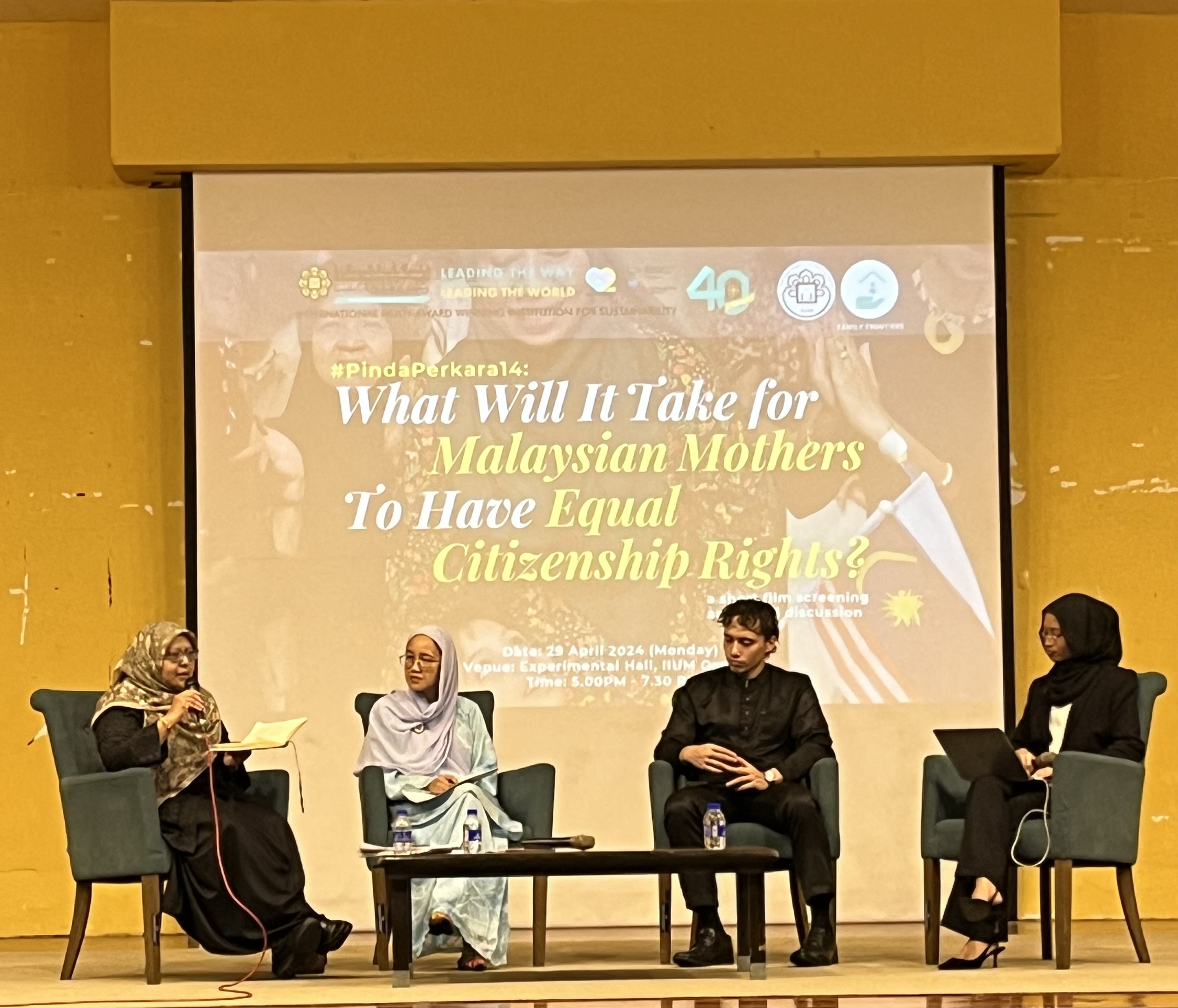By Nur Shahirah Aizah Mahmuzir and Nurin Najmina Zaidi
Gombak, 2 May 2024: In a bid to address longstanding gender inequality in Malaysia’s citizenship laws, the Intellectual Development Secretariat of IIUM Law Students’ Society organized the #PindaPerkara14 panel discussion in collaboration with Family Frontiers held at IIUMs Experimental Hall, Gombak on 29 April (Monday).
Malaysian women married to non-Malaysian men face significant hurdles in conferring citizenship to their overseas-born children, unlike Malaysian men in similar situations. Children born abroad to Malaysian mothers must apply for citizenship under Article 15(2) of the Federal Constitution. However, there was no guarantee of approval, thus leaving many families in legal limbo.
President of Family Frontiers, Mrs. Adlyn Adam Teoh, shed light on the current status of citizenship laws for children born abroad to Malaysian mothers as well as her experience as a mother with a son born 12 years ago in Beijing, China.
She emphasized the legal complexities involved where despite a proposed amendment aimed at granting women equal rights to pass on citizenship regardless of birthplace, the progress has been slow. The bill, tabled in the last parliamentary session, awaits debate, requiring a lengthy process involving consultations with the Conference of Rulers and securing a two-thirds majority in the Dewan Rakyat and Senate.
Meanwhile, a lecturer from IIUM’s Ahmad Ibrahim Kulliyyah of Laws (AIKOL), Dr. Hafizah Badrol Afandi, discussed the challenges faced by society and lawmakers in pursuing constitutional amendments. She highlighted that while there are typically no citizenship issues if a child is born in Malaysia, regardless of the nationality of the parents, complications arise when Malaysian mothers give birth overseas to children whose fathers are non-citizens.
In such cases, mothers are unable to confer citizenship to their children, while fathers, being Malaysian citizens, have the authority to do so. This discrepancy has led to longstanding gender inequalities and has become increasingly relevant as transnational marriages become more common in today’s globalized world.
She also emphasized the importance of upholding the principle of equality before the law, as enshrined in Federal Constitution Article 8(2), which prohibits discrimination based on gender. She noted that the current discrimination in citizenship laws is not in line with the spirit of this constitutional provision. Dr. Hafizah highlighted the challenges faced by Malaysian mothers, who often encounter derogatory remarks and societal pressures for marrying foreigners. œLove transcends beyond boundaries, soal jodoh dan ajal di tangan Tuhan, claimed the lecturer.
The case of Daniel, a talented rapper and musician, originating from a mixed Dutch background who shared his personal experience is saddening. Having lived in Malaysia for 20 years, he expressed a deep sense of belonging to the country, despite not having Malaysian citizenship. œI have always believed that I’m a Malaysian, because I grew up in Malaysia, just not by my identity card, said Daniel. As an aspiring athlete, he excelled in football until he reached the age of 16, when he encountered the barrier of nationality requirements.
Despite his talent and dedication, he found himself unable to pursue his passion due to citizenship constraints. Daniel further expressed his thoughts, œMy dream ends here. Expressing the uncertainty surrounding his future, Daniel revealed the limitations imposed by his tourist pass and the lack of opportunities available to him as a result. Daniel confronted the challenging truth of an unpredictable future and the possibility of separation from his family.
The push for constitutional reform has gained momentum, with major political parties acknowledging the need for change. However, the journey towards legislative amendment remains arduous, requiring concerted efforts from lawmakers and societal advocates alike. As Malaysia grapples with the complexities of transnational marriages, the call for equal citizenship rights resonates strongly, aiming to ensure fairness and inclusivity for all Malaysian families.¢¢¢¢
- #PindaPerkara14 calls for equal rights for Malaysian mothers - May 2, 2024
- 39th IIUM Convocation: Iraqi, Dr. Shaban, peaks on academic journey in Malaysia with Pharmacology PhD - November 29, 2023
- 39th IIUM Convocation: Break ‘all nurses are female’ stereotype, say three male nursing graduates - November 29, 2023
